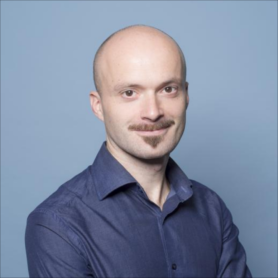(Speaker 2019) Dr. Massimo Mastrangeli
Dr. Massimo Mastrangeli
 About
About
Massimo Mastrangeli is Assistant Professor at the ECTM laboratory of the Microelectronics department of TU Delft, where he is developing silicon/polymer-based organ-on-chip and nanoparticle-based devices.
He acts as guest editor, editorial board member and reviewer for several technical and scientific journals, and is steering committee member and technical program committee member for several international conferences. Prior to joining TU Delft, Dr. Mastrangeli held research appointments at the Max Planck Institute for Intelligent Systems (Stuttgart, Germany) for soft microrobotics and granular matter, at the Université Libre de Bruxelles (ULB, Belgium) for micromechanics and capillary micromanipulation, at Ecole Polytechnique Fédérale de Lausanne (EPFL, Switzerland) for micro/nanofabrication and distributed robotics, and at imec Belgium (Leuven, Belgium) for fluidic microsystems integration and microelectronic packaging. Dr. Mastrangeli holds a BSc and MSc degree (both cum laude) in Electronic Engineering from the University of Pisa (Italy) and a PhD degree in Materials Engineering from University of Leuven (Belgium).
Presentation Abstract
To develop more effective products in shorter time, with lower costs and minimal side effects, pharmaceutical, cosmetic, chemical and other industries are looking for alternatives to standard cell cultures and animal tests, since those established systems do not entirely capture the physiological response of human organs let alone organisms. Born from the convergence of microfluidics and cell tissue engineering, organ-on-chip is a technology that may afford superior recapitulation of human (patho)physiology in vitro thanks to the precise control and monitoring of the three-dimensional cell culture microenvironment and the provision of dynamic electro-mechanical stimuli.
In this talk I will present the origin and context of the organ-on-chip technology, and illustrate the inherently multidisciplinary character of the field by focusing on some recent results of our own collaborative research.

